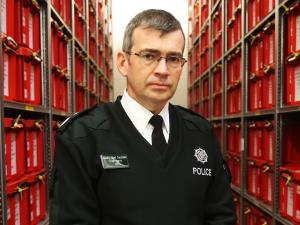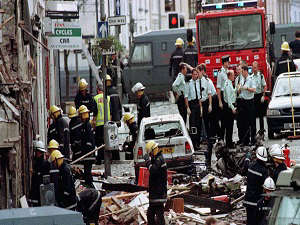
By Michael McHugh, Press Association
Some Police Service of Northern Ireland (PSNI) officers have "washed their hands" of welfare issues, a former sergeant says.
But the force's deputy chief constable Drew Harris contested that claim and said 398 officers and staff used a special helpline over the last 10 months, while 169 had received counselling.
The police's occupational health department offered almost 900 appointments a month.
Some officers present with symptoms consistent with post-traumatic stress disorder following a service involving difficult events dating back to the Troubles and more recently.
Mr Harris said: "Our society is becoming more fraught so more is required of us, and other frontline responders."
He added: "Vulnerability and then the crime and tragedy that comes from that is increasing in our society, you see that.
"It is very different from when I joined the police.
"In effect, we are a small number of people dealing with more of this stuff."
The ex-sergeant, who left the force in 2013, said civilianisation as part of peace process reforms made the system inflexible and less human.
"If you are an officer now and you can wash your hands of it and say we have the staff to do that, it does not have to touch you or blemish your copybook or alter your promotion."
He twice faced unsubstantiated and unfounded workplace allegations, and said he was made to feel like a criminal, "guilty until proven innocent".
He said: "Years ago officers were forged in fire, they had been through terrible times, they had witnessed friends dying, they had commanded over losing men.
"Nowadays, you have an officer coming up who has no responsibility or has, what the Tories in Government like to talk about, their portfolio.
"And that is his responsibility, full stop."
The officer's own mental health difficulties were partly linked to the death of a colleague who shot himself.
He had raised unprocessed files with the dead man, although he said the victim killed himself over an unrelated reason, leaving two children behind.
He said: "I dissolved, I could not stand up, I chain smoked, I cried, the wife did not know what had happened, she could not understand.
"I could not sleep or eat, in your head was only why."
He was asked to lead the bearer party at the funeral.
"I never slept until the day.
"I was waiting for his widow to get up and slap me and say I was responsible."
He later faced an unrelated and unsubstantiated workplace allegation from a colleague and became insular.
"I just felt like I was walking through treacle, I felt like there was no future, I was not being believed, made to feel like a criminal.
He said a more senior officer told him: "This is not a democracy."
Mr Harris said the PSNI had invested heavily in occupational health and self-help and modern grievance procedures had been in place 15 years.
He added: "We are a listening organisation."
He said the impact of work was going to be a never-ending issue for the PSNI, as it put people in difficult places.
"We are a 24/7 service so not many services are on the deck 24/7."
The anonymous officer was told he would not be prosecuted, but felt like he was being whispered about behind his back.
"You felt that the only person who knew the truth was yourself. I cried myself to sleep."
When he faced a second complaint, he took medical retirement aged 48.
"I felt broken, numb, it is just the nothingness, I did not want to go out of the house or meet anyone."


 Appeal to European Court being considered after ruling over Troubles disclosures
Appeal to European Court being considered after ruling over Troubles disclosures
 Executive agrees to set aside £119m for PSNI data breach payouts
Executive agrees to set aside £119m for PSNI data breach payouts
 Concern voiced as next phase of Omagh Bombing Inquiry hearings delayed
Concern voiced as next phase of Omagh Bombing Inquiry hearings delayed
 Four fatal house fires in three days in Northern Ireland ‘deeply concerning’
Four fatal house fires in three days in Northern Ireland ‘deeply concerning’
 ‘Much more to do’ to protect children in NI from sexual exploitation – report
‘Much more to do’ to protect children in NI from sexual exploitation – report